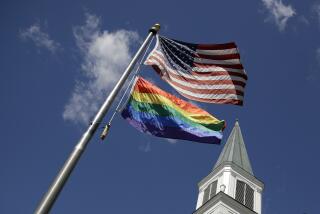Opening Doors to All Christians
- Share via
ALBANY, N.Y. — In mid-December, members of the New York State Council of Churches will gather for an unusual service: They will celebrate going out of business.
Beginning next year, the council of mainline Protestant and Orthodox denominations will reorganize as a larger New York State Community of Churches and open its doors to evangelicals and Roman Catholics.
Individuals and para-church organizations also will be invited to join. And in a ground-breaking move, the new organization will require only that members say they’re Christians, not conform to a more detailed statement of faith.
The change reflects a need to “move away from the systems approach and the bureaucratic approach,” said the Rev. Arleon Kelly, executive director of the council. “Since we’re really living on the edge of chaos, we’re moving into a time where relationships become the major thing in the life of the church.”
Many other state and local councils of churches--once bastions of establishment Protestantism--began opening to Catholics as far back as the 1960s and more recently to evangelicals.
But by shedding a detailed statement of faith and welcoming all comers who say they’re Christian, the New York council is going further than any of its counterparts, said Kathleen Hurty, director of the ecumenical networks office at the National Council of Churches.
Kelly noted that people cross denominations as effortlessly as they cross state lines. But he and others know that the notion of Christian unity does not come easily--particularly because many mainline Protestants support abortion rights and gay rights and many evangelicals and Catholics oppose them.
*
Kelly said he hopes the group can “deal with the conflict internally,” rather than requiring conformity among members. “It’s going to be slow going [with] mud in the face a few times,” he said. “That’s OK. There are a lot of families that have brothers who don’t like each other, too.”
He envisions the larger group not merely holding theological symposiums but also “family reunion” events involving worship services and concerts.
The new Community of Churches plans to begin formally inviting other Christians to join in 1997. Many evangelical and Catholic officials said it was too early to comment because they were just learning of the plans.
But Jeff Baran, executive director of the Christian Coalition of New York, said the abortion and gay rights issues pose “some very difficult questions” to those who would seek membership in the new organization.
The Christian Coalition is a political organization, but is considered a para-church group and would possibly be eligible to join the new group.
The two bodies have a history of cooperation. The council and the Christian Coalition, for example, have joined forces to combat legalized gambling in New York. Still, Baran is hesitant to join the new Community of Churches.
“We differ too much on too many important issues for us to say we’re a part of the Council of Churches, and I don’t think they would welcome us in a warm way either,” said Baran, whose group is the state affiliate of the national conservative political organization.
Both sides would suffer “guilt by association as well,” he said. “If someone is perceived as on the other side of the fence on an issue, then you’re going to be seen in that same light.”
A more tricky question, Kelly acknowledged, is how to handle groups such as the Church of Jesus Christ of Latter-day Saints (Mormons), and Jehovah’s Witnesses. Although these denominations consider themselves Christian, they have traditionally been considered unorthodox by other Christian groups.
“The community would have to deal with that, and that will come through dialogue,” Kelly said.
More to Read
Sign up for Essential California
The most important California stories and recommendations in your inbox every morning.
You may occasionally receive promotional content from the Los Angeles Times.










